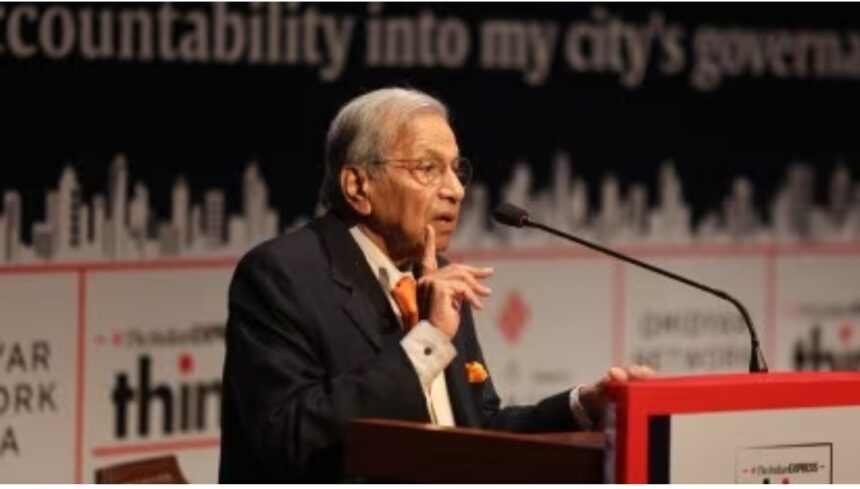NK Singh emphasised the surging pace of urbanisation, projecting that by 2050, half of the population of India will reside in urban areas. He raised concerns about how this would escalate emissions.
A CERTAIN percentage of the Goods and Services Tax can be allocated to support the third tier — local municipalities, according to NK Singh, Chairperson, 15th Finance Commission and also the chair of the policy think tank Institute of Economic Growth.
Delivering the keynote address at the inaugural session of The Indian Express Thinc series ‘Our Cities’, in association with the Omidyar Network, Singh said, the scarcity of resources faced by the third tier has been exacerbated by the merging of taxes with the GST. “This is a key concern,” he said, and emphasised the importance of financial autonomy and adherence to constitutional requirements.
“I stayed away from that (allocation out of GST collections to the third tier) since it is not a function of the Finance Commission but of the GST Council. (However) more thought needs to be given beyond what property tax can do to substantially enhance the resources of the third tier,” Singh said.
“The full adherence to the constitutional requirements of constituting a state finance commission in a timely way, with identical functions as the Central finance commission and alacrity with which they analyse those recommendations, take it to the state legislature and present an action taken report to the state legislature will make a substantial difference to the financial viability to the third tier institutions,” said Singh, who co-chaired the G20 expert group on reforms of multilateral development banks along with former Treasury Secretary of the US, Lawrence Summers.
The panelists included M Govinda Rao, Director of National Institute of Public Finance and Policy; Professor Debolina Kundu from the National Institute of Urban Affairs; Srikanth Viswanathan CEO Janaagraha; D Thara Additional Secretary, Ministry of Housing and Urban Affairs; and Shirish Sankhe, Senior Partner, McKinsey & Company.
Singh emphasised the surging pace of urbanisation, projecting that by 2050, half of the population of India will reside in urban areas. He raised concerns about how this would escalate emissions. “If there is a relationship between the pace of urbanisation and the pace of emission then the first challenge is to reputed institutions systems which can find most optimised solutions between balancing the compulsions of the environment to the compulsions of growth,” Singh said.
Addressing the challenges faced by the third tier of urban areas, he underscored how the amendments that brought in urban local bodies and panchayati raj have still not been implemented “in the full letter and spirit of what are provided in the two constitutional amendments”.
Singh pointed out deficiencies in the regulatory framework for urbanisation, emphasising the need for land reforms, digitization of land records, and transparent market practices. He touched upon the high costs associated with land availability, particularly in infrastructure projects such as highway constructions. According to Singh, addressing these issues is crucial for achieving economic development and investor-friendly policies.
While advocating against super-regulators to preserve states’ authority, Singh stressed on the necessity of coherence and symmetry in the regulatory framework for the entire urban sector. Balancing federalism with investor-friendly policies was highlighted as essential.
He also addressed the challenge of efficiently harnessing private capital for developmental banks. Despite their substantial capitalization, there has been limited success in attracting private funds.
For more information visit at https://happenrecently.com/zepto/?amp=1



